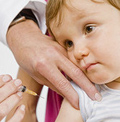 A review of the available evidence “underscores the safety” of the immunisation programme which has been criticised by some people concerned that children receive too many vaccines early in life. However, the IOM says there is no evidence to support this claim.
A review of the available evidence “underscores the safety” of the immunisation programme which has been criticised by some people concerned that children receive too many vaccines early in life. However, the IOM says there is no evidence to support this claim.
Around 90% of American children’s vaccinations closely follow the recommended immunisation schedule, according to the expert committee which has written a detailed report on vaccine safety
The IOM says more sophisticated systems for detecting problems with vaccines should continue to be developed to ensure any safety issues are highlighted as early as possible.
However, the report rejects calls from some immunisation critics for research comparing health outcomes of vaccinated children against health outcomes of children who have not been vaccinated or who do not follow the normal schedule.
A trial of this kind would mean randomly assigning large number of children to two groups, one of which would receive the recommended immunisations while the other would be given a dummy injection (placebo).
It would be unethical to deliberately put some children in the unvaccinated group as it would mean knowingly exposing them to higher risk of illness. On the other hand, some parents who refuse immunisations might also be reluctant to allow their children to be randomly assigned to the group that gets vaccinated.
The review poured cold water on suggestions that certain religious communities which refuse vaccinations could be used as a control group. This, says the IOM, would also throw up scientific challenges. For example, it would be difficult to recruit a large enough number of people to produce meaningful results because tens of thousands of participants are usually required for vaccine safety studies.
Even if differences in health outcome were found, it would be hard to be sure whether this variation was due to vaccination rather than another factor arising from socio-economic or genetic causes. Ideally, scientific studies require two groups of people which are the same in every way apart from the single factor scientists want to investigate.
The IOM concluded that, based on the evidence currently available, there is no cause to change the recommended immunisation schedule on safety grounds and the authors will continue to encourage parents to follow the schedule.
Read:
Institute of Medicine: ‘Vaccines do not cause autism’
Can giving several vaccines overwhelm child’s immune system?



